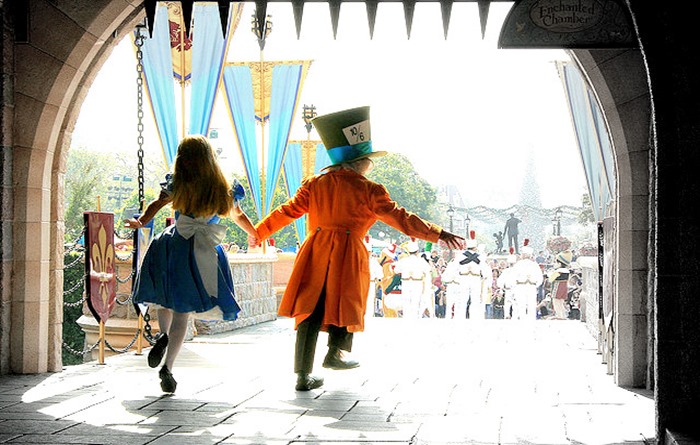The Difference between a Leader and a Lunatic: the Ability to Communicate
The word crazy is now overused. “This must be crazy”, “I am crazy”, “You are crazy”, “That is crazy”.
“Crazy”, according to dictionary, is defined as “mentally deranged, especially as manifested in a wild or aggressive way.” I think in most cases, what “crazy” actually refers to is “different”. Still, different from… what?
Then let’s take a closer look at “different”. It means “not the same as another or each other; unlike in nature, form, or quality.”
But, think about it. Aren’t are all “not the same as another or each other?” Aren’t we all “unlike in nature, form, or quality?”
So we are different. You are different. I am different. So is she. Each of us is a distinct individual to our DNA.
So isn’t it our default setting to be “different”? If “being different” is natural, isn’t suppressing this all-too-human state an insanity?
“Different”, or you might call “crazy”, turns out to be not crazy at all.
I have been contemplating the notions of “madness” and “being different” since I’d finished Veronika Decides to Die – I always read or reread a Paulo Coelho’s book. The story happens inside an asylum, in which the protagonist is Veronika is locked up after her failed suicidal attempt. The narrative leads the readers through a journey to rediscover life and the desire to live by unveiling the decaying, self-suffocating attempt to be “normal” and safe. The cure for a withering life is to only live.
Veronika Decides to Die is, in its entirety, a mind-boggling read and reread that can alter your worldview. Coelho himself was a forced-then-turned-voluntary mental patient. During his youth, he was sent twice to the madhouse by his parents. In the afterword of the book, Paulo Coelho puts forth a question:
What exactly is madness?
And he answers:
Madness is the inability to communicate.
This definition, coming from a formal “mental patient” and now arguably the most beloved author of our time, astounds me.
We all know stories of the “mad geniuses” whose ideas and personality were considered absurd by the population and the authority in their time. Galileo Galilei was alienated and put under house arrest until he died because he insisted that the sun, not the earth, is the center of the cosmos. Albert Einstein was thought to have psychological disabilities because he could not do well in school. So do some of the world's most distinguished creative minds: writers Mary Shelley, Virginia Woolf, and Ernest Hemingway; composers Irving Berlin; and painters Michelangelo, Paul Gauguin and Jackson Pollock. So do some of the world's most distinguished creative minds: writers Mary Shelley, Virginia Woolf, and Ernest Hemingway; composers Irving Berlin; and painters Michelangelo, Paul Gauguin and Jackson Pollock.
The label “different” doesn’t match these individuals. They are simply those who have come alive – the few bright spots in the immense grey canvas of a conformed society. The few ones that persist the struggle for being themselves.
“To be yourself in a world that is constantly trying to make you something else is the greatest accomplishment,” Ralph Waldo Emerson understands well how formidable this battle is, even a century ago.
Besides having come alive, they have one more thing in common: they communicate. To be able to communicate an idea, no matter how eccentric it is, draws the line between a leader and a lunatic.
Most people lives in his own world. And so should he, with all his might, and through all his life. “Imagination is more important than knowledge”, Albert Einstein says. However, at one point, he must realizes that he has an important decision to make: whether to share his world with others. Not in the hope of being right, but in the hope of being understood. And perhaps if others understand him and want to live in that world too, they will help him to make it come true. That’s how changes happen.
For a leader, for any change-agent, talking the walk is as important as walking the talk.
I thought of myself and my own world. Every now and then I’m crippled by the fear of being wrong. I try to remind myself that to understand and being understood is more important than being right. And that there is grace in saying “I am wrong.”
When I overcome the fear of being wrong, a more menacing fear emerges: fear of isolation, of rejection, of trying in vein. Perhaps my world is too different, too daring. Every now and then I resign to my rabbit hole: “They will never understand,” and secretly enjoy the misfortune of the genius. But coming alive doesn’t mean withdrawal. Coming alive means to express myself despite fears, to dance through the world and make others dance too. So I start to write my stories – this story is one of them – with the hope of being understood, of inspiring others, and maybe, of changing the world.
What about you?
You are different, without even trying.
Are you being yourself and expressing your world?

On the theme of leadership, read A Leader or a Member, Lead the Way Only You Can; or more on authenticity try out Jealousy, Candy, and the Futile in Comparison, or Want to be Real? Try Turning off The Light!
- - -
Bringing you Life Written takes countless hours of heart work. Help me to know that I’m doing something right by:




